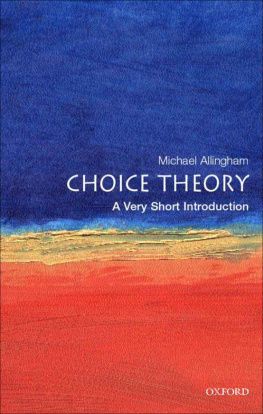Gaertner - A primer in social choice theory
Here you can read online Gaertner - A primer in social choice theory full text of the book (entire story) in english for free. Download pdf and epub, get meaning, cover and reviews about this ebook. City: Oxford, year: 2010;2009, publisher: Oxford University Press, genre: Romance novel. Description of the work, (preface) as well as reviews are available. Best literature library LitArk.com created for fans of good reading and offers a wide selection of genres:
Romance novel
Science fiction
Adventure
Detective
Science
History
Home and family
Prose
Art
Politics
Computer
Non-fiction
Religion
Business
Children
Humor
Choose a favorite category and find really read worthwhile books. Enjoy immersion in the world of imagination, feel the emotions of the characters or learn something new for yourself, make an fascinating discovery.

- Book:A primer in social choice theory
- Author:
- Publisher:Oxford University Press
- Genre:
- Year:2010;2009
- City:Oxford
- Rating:4 / 5
- Favourites:Add to favourites
- Your mark:
- 80
- 1
- 2
- 3
- 4
- 5
A primer in social choice theory: summary, description and annotation
We offer to read an annotation, description, summary or preface (depends on what the author of the book "A primer in social choice theory" wrote himself). If you haven't found the necessary information about the book — write in the comments, we will try to find it.
A primer in social choice theory — read online for free the complete book (whole text) full work
Below is the text of the book, divided by pages. System saving the place of the last page read, allows you to conveniently read the book "A primer in social choice theory" online for free, without having to search again every time where you left off. Put a bookmark, and you can go to the page where you finished reading at any time.
Font size:
Interval:
Bookmark:
A Primer in Social Choice Theory
Revised Edition
LSE Perspectives in Economic Analysis
Series editors
Timothy Besley and Frank Cowell
The LSE Perspectives in Economic Analysis series provides concise and original insight into a wide range of topics in economics. Each book is accessibly written but scholarly to appeal to advanced students of economics, and academics and professionals wishing to expand their knowledge outside their own particular field.
Books in the series
A Primer in Social Choice Theory byWulf Gaertner
A Primer in Social Choice Theory, Revised Edition byWulf Gaertner
Strategy and Dynamics in Contests by Kai A. Konrad
Forthcoming books
Econometric Analysis of Panel Data by Vassilis Hajivassiliou
Measuring Inequality by Frank Powell
Revised Edition
Wulf Gaertner


Great Clarendon Street, Oxford 0x2 6DP
Oxford University Press is a department of the University of Oxford.
It furthers the Universitys objective of excellence in research, scholarship,
and education by publishing worldwide in
Oxford New York
Auckland Cape Town Dar es Salaam Hong Kong Karachi
Kuala Lumpur Madrid Melbourne Mexico City Nairobi
New Delhi Shanghai Taipei Toronto
With of fices in
Argentina Austria Brazil Chile Czech Republic France Greece
Guatemala Hungary Italy Japan Poland Portugal
Singapore South Korea Switzerland Thailand Turkey Ukraine Vietnam
Oxford is a registered trade mark of Oxford University Press
in the UK and in certain other countries
Published in the United States
by Oxford University Press Inc., New York
Wulf Gaertner, 2009
The moral rights of the author have been asserted
Database right Oxford University Press (maker)
First published 2006
All rights reserved. No part of this publication may be reproduced,
stored in a retrieval system, or transmitted, in any form or by any means,
without the prior permission in writing of Oxford University Press,
or as expressly permitted by law, or under terms agreed with the appropriate
reprographics rights organization. Enquiries concerning reproduction
outside the scope of the above should be sent to the Rights Department,
Oxford University Press, at the address above
You must not circulate this book in any other binding or cover
and you must impose the same condition on any acquirer
British Library Cataloguing in Publication Data
Data available
Library of Congress Cataloging in Publication Data
Data available
Typeset by SPI Publisher Services, Pondicherry, India
Printed in Great Britain
on acid-free paper by
MPG Biddles Ltd., Kings Lynn, Norfolk
ISBN 978-0-19-956530-6
10 987654321
To the memory of my parents
and
to my family
In her otherwise very positive review of the first edition of this Primer in the journal Social Choice and Welfare (Vol. 30,2008), Antoinette Baujard deplored the absence of exercises. This criticism was more than justified, since a primer is written for beginners. It is especially important that they find out for them-selves whether they have correctly understood the concepts introduced in the text, and furthermore some of the logical inferences may be uncommon to them. In this revised edition, the reader will find 8-10 exercises at the end of each of Chapters 1-9. Some of the exercises are very easy, and are just intended to make sure that the reader has thoroughly understood what is discussed in the text, others are a bit trickier. Work with pencil and paper can be very illuminating and rewarding. Hints toward a solution of some of the exercises are gathered at the end of the book. I am grateful to Nick Baigent and John Weymark for allowing me to take a look at some of the exercises that they devised for their own course in social choice theory.
Otherwise, this new edition sees a few minor additions and amendments that are meant to lead to greater clarity. I wish to thank both teachers and students of collective choice theory for the comments and suggestions that they made on the first edition. These were very encouraging for me. In particular, I wish to thank Greg Fried for his observations in relation to the ArrowSen proof discussed in section 2.2. Finally, I am much indebted to OUP, especially to Sarah Caro, for making this new edition possible.
Osnabrck and London
March 2009
Wulf Gaertner
This book is meant to be an introductory text into the theory of social choice. It is not a book for readers who have already acquired a basic knowledge of social choice theory and now wish to tackle more specialized issues. There do exist some very fine advanced textbooks on collective choice and related questions. This primer is written for undergraduates and first year graduates. Prerequisites are very small: some knowledge of elementary set theory and some basic knowledge of mappings in IRn. The main aim is to attract readers to an area which revolves around the problem of aggregating individual preferences. These questions are interesting and highly relevant both for small communities and large societies. It would be nice if, while going through the various chapters of this primer, the reader were to develop an interest and curiosity for more. There is so much more which is not covered in this book. As said above, there are very good books that will guide the reader beyond what is being discussed in the present text.
This primer in social choice theory is based on various courses that the author has taught at different places over the years. Long and very fruitful discussions with Nick Baigent, Prasanta Pattanaik, Maurice Salles, Amartya Sen, Kotaro Suzumura, John Weymark, and Yongsheng Xu are gratefully acknowledged. Without the gentle advice and guidance of these and other eminent scholars, this book would never have been written. I am deeply indebted to all of them.
I am very grateful to Constanze Binder at Groningen University who took pains to read most parts of the text. I received a lot of interesting and very helpful comments from her. I also wish to thank two referees for their constructive criticism. I am grateful to Brigitte Arnold who helped me tremendously to turn the various versions of my manuscript into a readable text. I also wish to thank Christian Aumann who did a fine job in producing the figures for this primer. We hope that these graphs will enhance the understanding on the part of the reader.
Tim Besley and Frank Cowell from STICERD at the London School of Economics were kind enough to accept this primer as the first book in a new series. Special thanks to them. Last but not least I wish to thank Sarah Caro and her collaborators at Oxford University Press for the production of this book.
Wulf Gaertner is Professor of Economics at the University of Osnabruck, Germany. He is one of the managing editors of the journal Social Choice and Welfare. In the past, he has been visiting scholar at Harvard University and the London School of Economics. He was awarded a Ludwig Lachmann Research Fellowship for the years 2006-2008 given by the London School of Economics.
Social choice theory is an analysis of collective decision making. The theory of social choice starts out from the articulated opinions or values of the members of a given community or the citizens of a given society and attempts to derive a collective verdict or statement. Such a situation can be called direct democracy, where public actions are determined directly by the members of society. Another form of democratic government is also possible and, actually, more frequent in modern societies, viz. representative government where public actions lie in the hands of public officials who are elected by citizens. We shall largely abstract from these two forms and say a bit later on in this book, and this sounds, admittedly, somewhat technical, that the preferences of the individual members of a given society are aggregated into a social preference that reflects the general opinion or will of this society.
Next pageFont size:
Interval:
Bookmark:
Similar books «A primer in social choice theory»
Look at similar books to A primer in social choice theory. We have selected literature similar in name and meaning in the hope of providing readers with more options to find new, interesting, not yet read works.
Discussion, reviews of the book A primer in social choice theory and just readers' own opinions. Leave your comments, write what you think about the work, its meaning or the main characters. Specify what exactly you liked and what you didn't like, and why you think so.






